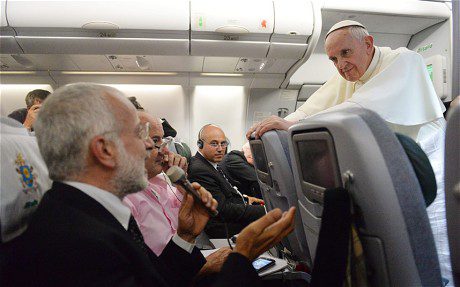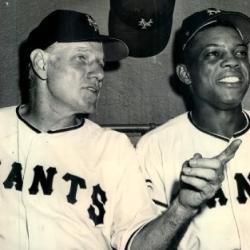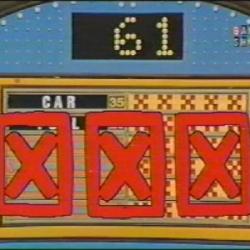“If someone is gay and he searches for the Lord and has good will, who am I to judge?” Francis told reporters, speaking in Italian but using the English word “gay.”
That’s a bit suprising.
Let’s start with just those last five words, which may be the biggest departure in tone from his predecessor. “Who am I to judge?” wasn’t something we heard much, if ever, from Benedict XVI — a guy who seemed to enjoy heading up the Congregation for the Doctrine of the Faith (formerly known as the “Supreme Sacred Congregation of the Roman and Universal Inquisition,” really) and then changed his name so that it included the word “edict.”

“Who am I to judge?” seems like a pretty un-pope-like thing to say. Francis, after all, was literally enthroned by his denomination as the final arbiter of all matters apostolic. He was given a hat, a scepter and a ring all symbolizing that judging is pretty much his job description. But one of the things it’s hard not to like about Francis is that he doesn’t seem overly impressed with hats, scepters, rings and thrones — and even less so now that he’s the one wearing them and sitting on them.
“Who am I to judge?” is, taken by itself, good Baptist theology, so I have to applaud that part.
This also creates a happily awkward situation for the bishops over whom Francis is bishop. Many of them — particularly here in America — seem enormously impressed with hats and throne and scepters. “Who am I to judge?” is not a question one expects to hear from them, except maybe in order to quickly answer it themselves: “I’m the bishop, that’s who — so you’d better listen.”
Now that the pope himself has given this question his blessing, it would be nice to see it redirected toward some of those bishops. “Cardinal Dolan, who are you to judge?”
Based on some of Francis’ other recent comments, I’m not sure this subversive effect is wholly unintentional. The pope’s comments above, after all, were made on his way home from World Youth Day in Rio de Janeiro, where his message to political leaders was “dialogue, dialogue, dialogue” and his message to tens of thousands of young people was a commission to “make a mess” in their dioceses.
Actually, according to Mary Hunt, his invitation to those young people was to become troublemakers:
On July 25, in a rousing speech to young people, he stated: “quiero lío en las diócesis,” which the English language press prissily translated as a plea for the youth to “make a mess.” I suspect that those more familiar with the Argentine way of speaking would have rendered it “go ahead and ‘screw up,’” though that is a bit unseemly for a pontiff. What Francis appears to have meant is that he wants young people to shake things up in their local situations as they manifest their faith.
Sara Benincasa’s take isn’t as hyperbolic as it seems: “New Pope Wants Kids Wilding in the Streets,” says the jokey Wonkette headline. But it’s only half-jokey. “A young person who does not protest, I do not like,” Francis said in Rio.
I’m with him on that bit, too, although I also agree with Hunt when she says of such protests and mess-making: “Whether the institutional church will permit much of it remains to be seen.”
Francis also had some good things to say about poverty and the environment, but the biggest media splash surrounded the comment at the top of this post. “If someone is gay and he searches for the Lord and has good will, who am I to judge?” is where most of the reaction is focused.
That initial big splash came from the idea that this comment indicated some kind of big change in Catholic teaching or practice regarding LGBT people. Here I’ll take what will probably be my one and only opportunity to agree with both Fr. Geoff Farrow and Al Mohler who both note — one with dismay and the other with delight — that Francis’ remarks leave the teaching of the Catechism unchanged and unchallenged.
Father Farrow’s response is worth reading in full:
“If someone is gay…” Substitute the word “straight” for “gay” and you begin to see the problem; in fact, whenever an issue arises regarding gender orientation, simply do that: Substitute the word “straight” for “gay.” Does the statement still make sense?
Farrow has, for many years, been making a mess and protesting, and that hasn’t gone over very well with the bishops or with Francis’ predecessors, so he’s not inclined to give the new pope partial credit for at least changing the tone of his remarks. Changing the tone without changing the substance, Farrow says, “is a way of appearing to change everything without changing anything.”
He’s got a point. A change in tone without any change in substance is, well, insubstantial.
But perhaps it’s not completely insubstantial. The substance of Catholic teaching and Catholic behavior toward LGBT people needs to change. But the tone needed to change too. It matters less, but it still matters, that Francis spoke of someone who “is gay,” rather than of someone who is “homosexual” or who is “intrinsically disordered.” It is, at least, a step back from the silly authoritarian semantic games in which church leaders claim the right to define others as othered. Accepting the language that others use for themselves is a tiny step in the direction of coming to terms.
But, yes, still a relatively insubstantial step. It might mean something, I suppose, if the folks from Westboro Baptist started waving signs that read “God Hates LGBTQI People,” instead of what their infamous signs usually say now. That would be an improvement of sorts, but still a far cry from good.
So my response to this comment is much like Grandmere Mimi’s, “I don’t see the pope offering hope for any change in practice. The pope’s tone is more pastoral than previous popes, but that’s about it.” She also links to a Daily Mash bit that flips the script nicely:
A gay man has said that although Pope-ish acts are bad, a Pope-ish orientation is not.
In what his friends claim is a softening of his stance on Popes, 38-year-old gay chef Tom Logan claimed he was fine with them as long as they didn’t do any Pope stuff.
He said: “If a person is a Pope but has good will, who am I to judge them?
“And it would be even more ridiculous if I were to say that then continue by telling Popes how to behave.”
That’s pretty good Baptist theology too.
Think Progress’ Igor Volsky reports on Cardinal Tim Dolan’s damage-control efforts following Francis’ remarks:
But the Cardinal hasn’t always followed his own advice and has repeatedly condemned the rights of same-sex couples under the guise of love and support for the gay community.
After lobbying against New York’s marriage equality law, Dolan prohibited by decree any Church personnel or property from being utilized for same-sex marriage ceremonies under penalty of “canonical sanctions,” calling the state’s law “irreconcilable with the nature and the definition of marriage as established by Divine law.” He has also compared the “threat” posed to marriage by gays and lesbians to that of polygamy, adultery, forced marriage, communist dictatorships, and incest. …
Again, we now have a set response every time Dolan says stuff like that, or whenever he calls the cops to keep gay Catholics from attending mass: “Who are you to judge?” Is he claiming to have more authority than his boss? (I seem to recall his boss’s boss also had something to say about judging others.)
William Lindsey offers his own initial response to the pope’s remarks, and his response to the response in U.S. Catholic media:
When the leaders of powerful Catholic institutions that determine what’s considered normative begin to include openly gay voices, when they ask gay and lesbian Catholics to give our testimony in official conversations that count for something in the real world, and when they begin to be willing to listen respectfully to what we have to say, even when our testimony calls on these leaders to confront their own unmerited privilege and the way in which they have inflicted pain on fellow Catholics they have long treated as the other, I may begin to hear the words of Francis about what John Allen calls “homosexuals” with ears open to hope and joy.
He’s also got a good round-up of other thoughtful responses.












